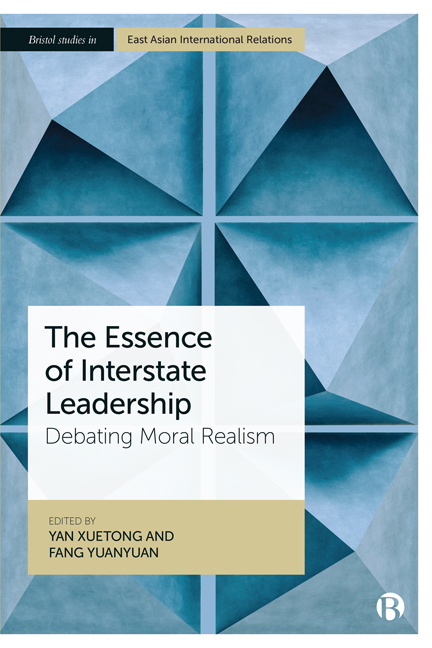Book contents
- Frontmatter
- Contents
- List of Abbreviations
- Notes on Contributors
- Preface
- 1 Interstate Leadership, Moral Realism, and their Critics
- 2 IR Moral Realism as a Universal Theory
- 3 Moral Realism as an Alternative Approach to the Agent-Structure Problem
- 4 Prospects, Promise, and Limitations of Moral Realism
- 5 Ideal Morality and Realist Interest of Moral Realism
- 6 The Conception of Morality in Moral Realism
- 7 Moral Realism and Hegemonic Transition
- 8 Innovation of Moral Realism and Dialogue with It
- 9 Moral Realism and Sino-American Relations
- 10 Moral Realism on Interstate Leadership in Response to Critics
- Appendix 1 Written Discussion between Rajesh Rajagopalan and Yan Xuetong
- Appendix 2 ‘Chinese School’ as an Inappropriate Title
- Selected Bibliography
- Index
Appendix 2 - ‘Chinese School’ as an Inappropriate Title
Published online by Cambridge University Press: 18 January 2024
- Frontmatter
- Contents
- List of Abbreviations
- Notes on Contributors
- Preface
- 1 Interstate Leadership, Moral Realism, and their Critics
- 2 IR Moral Realism as a Universal Theory
- 3 Moral Realism as an Alternative Approach to the Agent-Structure Problem
- 4 Prospects, Promise, and Limitations of Moral Realism
- 5 Ideal Morality and Realist Interest of Moral Realism
- 6 The Conception of Morality in Moral Realism
- 7 Moral Realism and Hegemonic Transition
- 8 Innovation of Moral Realism and Dialogue with It
- 9 Moral Realism and Sino-American Relations
- 10 Moral Realism on Interstate Leadership in Response to Critics
- Appendix 1 Written Discussion between Rajesh Rajagopalan and Yan Xuetong
- Appendix 2 ‘Chinese School’ as an Inappropriate Title
- Selected Bibliography
- Index
Summary
A growing number of IR scholars, Chinese and foreigners alike, believe that a ‘Chinese School’ of IR theories has been formed in the last decade. This view gained popularity partially due to Amitav Acharya's effort to advance the concept of ‘global IR’ (GIR). Although he replaced the term ‘Chinese School’ with the ‘Chinese IRTs’ (Chinese IR theories), most IR scholars usually view them as the same and ignore the fine semantic distinction between them. Acharya believed that ‘Chinese IRTs significantly enriched IR theory and discipline as a whole and especially to the quest for a GIR’. His view has reinforced the belief that a ‘Chinese School’ exists. However, the label ‘Chinese School’ is a misnomer, because Chinese scholars have constructed IR theories according to different, or even antithetical, ontology, epistemology, and assumptions.
A title derived from a misnomer
As I understand it, the popularity for a ‘Chinese School’ reflects the anxiousness at the absence of a ‘Chinese School’ in political science rather than the pride for forming such a school. The push for domestically developed IR theories originated in 1987 at an academic conference in Shanghai. In the 1990s, the idea was framed as ‘IR theories with Chinese characteristics’. The term Zhongguo Xuepai (Chinese School) was coined by young Chinese IR scholars around the turn of the century. After more than two decades, Chinese IR scholars have yet to reach an agreement on the issue of constructing a ‘Chinese School’. In 2021, Xu Jian says, ‘Because of various historical reasons, we have not yet constructed a system of IR theories with Chinese characteristics’.
To understand the craving for a ‘Chinese School’ among Chinese IR scholars, it is necessary to mention the terminological impact of the ‘English School’. The ‘English School’ encompassed IR theories constructed by European scholars that shared an institutionalist framework. However, instead of naming the school after the theoretical framework, the school was associated with the nation of Great Britain, sometimes also called the ‘British Institutionalists’. Unfortunately, this nomenclature practice was imitated by their Chinese colleagues. As Barry Buzan, one of the founders of the English school, noted in 2007, the name ‘English School’ makes an erroneous linkage between the approach of this theory and Britain: that the school was established in Britain or of serving Britain's interests.
- Type
- Chapter
- Information
- The Essence of Interstate LeadershipDebating Moral Realism, pp. 216 - 220Publisher: Bristol University PressPrint publication year: 2023



